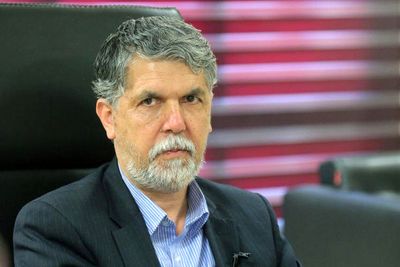Minister of Culture and Islamic Guidance Abbas Salehi said resistance cinema enjoys a long life in cinema history.
He said that the issue of resistance and endurance has a special place in our religious literature, adding that the essence of resistance and perseverance in the social arena refers to stability in principles and goals.
“Resistance cinema has a long life in cinema history. From the first days of film production, the cinema and the camera established a relationship with right, unity and justice,” the minister said.
“Resistance cinema narrates the oppression of people who suffer from occupation, apartheid and racism, people who suffer from Takfiry atrocities, and those who have been deprived of their national and religious identities.
“Also, the resistance cinema narrates truth and justice in the field of genuine and lasting messages in various fields of human dignity, human rights, and self-sacrifice,” he added.
“In our cinema and post-revolutionary cinema, we have witnessed remarkable events in the field of feature, short, and documentary films,” the minister added.
He stressed that Iranian cinema has been connected to the issue of resistance, adding that the issue of Palestine and the occupation of the occupiers in different parts of the Middle East the world, the regional and trans-regional issues and dozens of other topics have enjoyed a significant place in Iranian feature, short and documentary films.
“At present, resistance cinema, on a national and international level, has become a style and genre which has found its own meaning and moves forward,” the minister said.
“Resistance cinema should be more active than before in networking. Writers, producers, directors and others who are in resistance cinema should exchange works and advance the flow resistance cinema,” he added.
“This year, RIFF was accompanied by three special phenomena that have been influential in this event and can be considered a new event. The first was the 40th anniversary of the Sacred Defense War,” he said.
“Undoubtedly, the eight-year Defense War is a great human social phenomenon, the same as the Sacred Defense cinema. This cinema started from the first years of the Sacred Defense. From that time, we have witnessed the presence of many cinematographers and films,” he added.
The Iranian minister reiterated that the Sacred Defense cinema is a gem at the heart of world cinema, which, both in the past and in the future, will help global resistance cinema with new efforts, initiatives and creativity.
He added that the second point which the festival faced in this edition was the commemoration of Martyr General Qassem Soleimani in the Resistance Prominent Martyr section.
“Martyr General Soleimani has been and will be the center of the idea and expansion of ideas for resistance cinema,” he said.
“The third issue faced by the festival was the global issue of the coronavirus. This issue can be defined as a form of resistance, symbolizing self-sacrifice and cooperation,” he added.
The Iranian minister also expressed the hope that what happened in this edition of the RIFF will be the basis for developments in Iranian cinema in the field of justice.
He also wished that such positive events could be repeated in Iranian cinema in the future.

